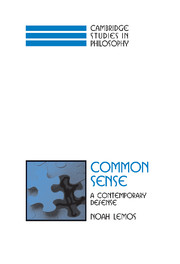Book contents
- Frontmatter
- Contents
- Acknowledgments
- Preface
- 1 The Common Sense Tradition
- 2 Common Sense and Reliability I
- 3 Common Sense and Reliability II
- 4 Reid, Reliability, and Reid's Wrong Turn
- 5 Moore, Skepticism, and the External World
- 6 Chisholm, Particularism, and Methodism
- 7 Common Sense and A Priori Epistemology
- 8 Particularism, Ethical Skepticism, and Moral Philosophy
- Conclusion
- Selected Bibliography
- Index
1 - The Common Sense Tradition
Published online by Cambridge University Press: 22 August 2009
- Frontmatter
- Contents
- Acknowledgments
- Preface
- 1 The Common Sense Tradition
- 2 Common Sense and Reliability I
- 3 Common Sense and Reliability II
- 4 Reid, Reliability, and Reid's Wrong Turn
- 5 Moore, Skepticism, and the External World
- 6 Chisholm, Particularism, and Methodism
- 7 Common Sense and A Priori Epistemology
- 8 Particularism, Ethical Skepticism, and Moral Philosophy
- Conclusion
- Selected Bibliography
- Index
Summary
In this chapter, I begin by describing some of the main features of the common sense tradition, whose chief representatives include Thomas Reid, G. E. Moore, and Roderick Chisholm. There are certainly important differences among the views of Reid, Moore, and Chisholm, but I think one can give a rough account of some central features of the common sense tradition. In the first section, I describe some of the main views accepted by members of the tradition as well as some views to which they are not committed. In the second section, I consider some views about why we should take various common sense propositions as data for assessing philosophical theories. Philosophers in the common sense tradition have offered different sorts of answers to this question. Sometimes they suggest that we simply have no alternative to taking these propositions as data. Sometimes, however, it is suggested that such propositions are “irresistible” – that we cannot give up our belief in them. Reid, for example, appears in places to take this view. In other cases, they point, not to irresistibility, but to the positive epistemic character of our beliefs in such propositions as that which makes them worthy of being taken as data. On this view, it is the fact that we know or are justified in believing certain propositions that makes them worthy of being taken as data. This “epistemic answer” seems to me to be the best.
- Type
- Chapter
- Information
- Common SenseA Contemporary Defense, pp. 1 - 23Publisher: Cambridge University PressPrint publication year: 2004



